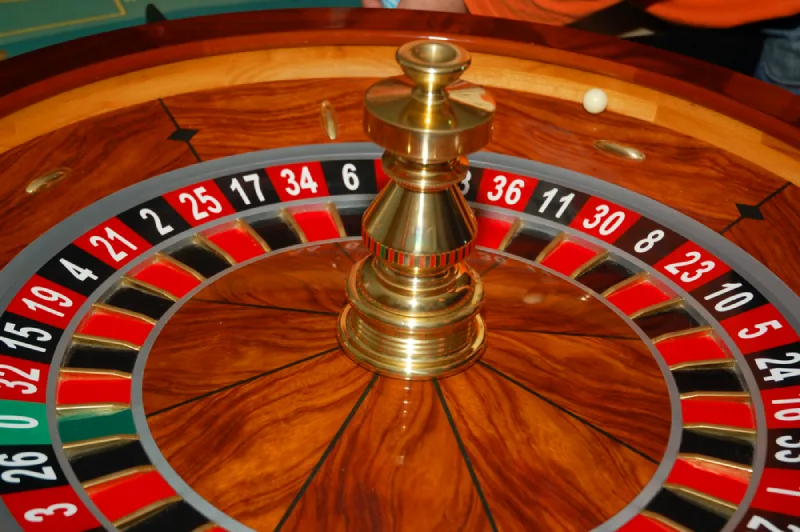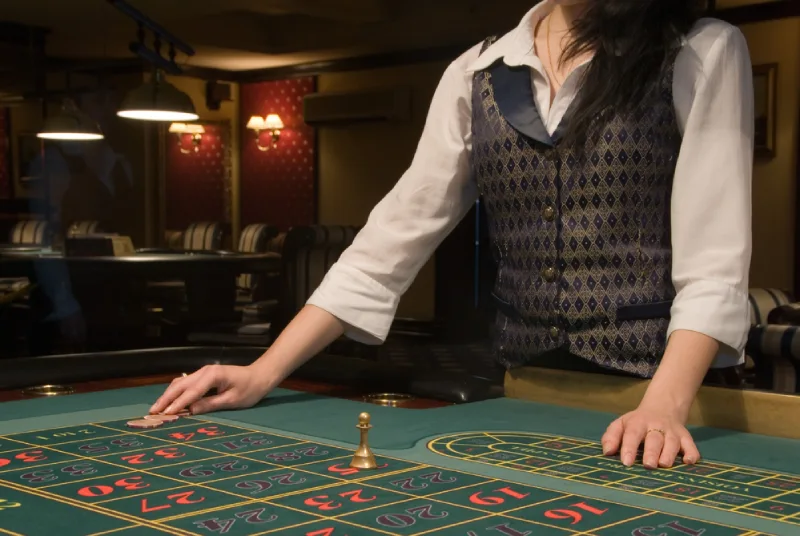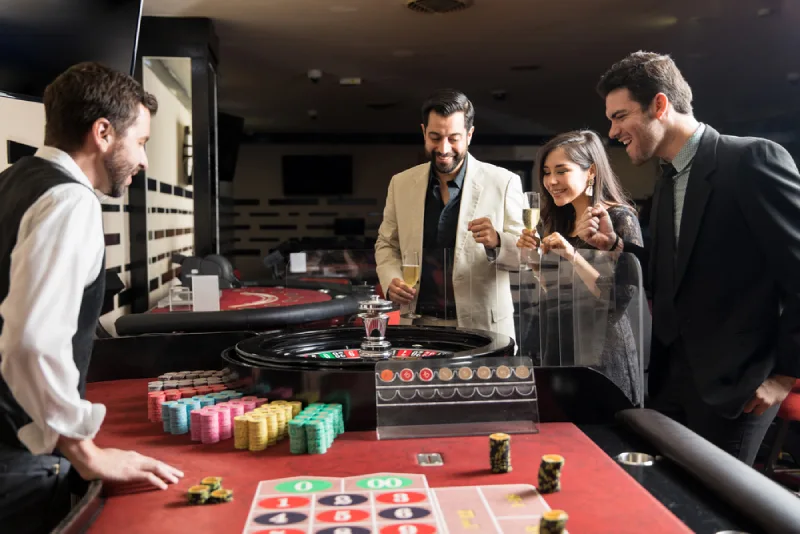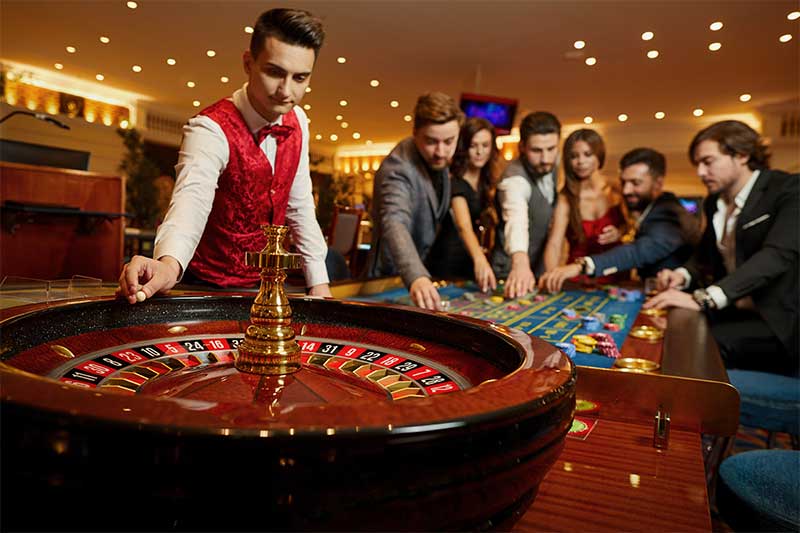There are two equally divergent opinions on this question. Conversely, roulette dealers rarely cheat because they have no reason to dupe players in favor of the casino. Like all casino games, roulette has a house edge of around 5.26% and a negative expectation for the players. They don’t need to use dealers to cheat to profit from roulette.
All casino environments, including areas around the roulette table and wheel, have multiple cameras watching every bit of action.
If dealers are found guilty of cheating in any way, including stealing chips, colluding with players, or tampering with the machine, they will be arrested and potentially sent to prison.
Besides, roulette is largely a game of chance; no one, including the dealer, knows where the ball will land. Because of that, it is exceedingly difficult for dealers to cheat. Moreover, gaming controls require dealers to change balls and points from which they roll the ball several times during their dealing session. The casino risks losing its gambling license if the dealer breaches these gaming control rules. They will do everything in their power to prevent that.

On the other hand, circumstantial evidence seems to show that dealers can influence where the roulette ball lands. It is this way that they can cheat in favor of some players. Dealers can also cheat by allowing past posting, whereby the player is allowed to place bets on the winning number on the betting grid after the ball lands. They can also overpay chips or fail to collect losing chips.
In a nutshell, roulette dealers have little to no incentive to cheat for the casino. However, they can cheat on behalf of players whom they are collaborating with so that they can share the profits outside the casino. Note that the casinos don’t encourage dealers to cheat because they already have an inherent odds advantage in the roulette game (aka the house edge).
Can roulette dealers control the ball?
The short answer is no: roulette dealers cannot control the ball or where it will land on the wheel. However, there are different opinions on this question, as well.
Some dealers have come out to say that they can control which third of the roulette wheel the ball will land. Others have gone ahead to claim they can land the ball on the same number spin after spin. And there is statistical evidence that some dealers tend to hit a group of numbers repeatedly.
Croupiers have several-sized balls and can choose one that will work best for their spinning strategy.
In one example, a dealer demonstrated to his friend on a roulette wheel in the back training room by landing the ball on just two neighboring numbers, 19 and 31, in eight consecutive spins. He did this by adjusting the wheel speed and throwing the ball from about the same point.

On the other hand, any land-based casino does not control the ball using a computer, magnet, or any other device to ensure it lands on the desired number. Instead, they rely on the randomness of the roulette wheel and the house edge to ensure they make a profit. Remember, American Roulette gives the casino a house advantage of roughly 5.26%, meaning $5.26 out of every $100 wagered by the player will be lost to the casino.
The design and dynamics of the roulette wheel make it exceedingly difficult for dealers to control the ball. By design, the roulette wheel moves counterclockwise with a decaying speed as the spinning momentum dissipates. Meanwhile, when the ball is thrown, it moves clockwise along the track with a very shallow slope, making it incredibly difficult to predict where it will lose adequate centrifugal force to land.
Other factors influencing where the ball will land include diamond-shaped patterns spread along the track, raised bumps on the slope, and wheel bias.
Additionally, the frets on the wheel for each roulette number have 3cm spacing, so the ball frequently bobbles before getting into the pocket.
There are many roulette wheel brands and several-sized balls, all of which are designed and work slightly differently. All these design differences make it nearly impossible for the dealer to control the ball’s final landing position.
The same is true of live roulette dealers at online casinos. The croupiers operate from a land-based studio and use the same balls, wheels, and chips as brick-and-mortar casinos. The virtual roulette games at gambling sites use random number generators (RNGs), so the casino does not control where the ball lands. It is the job of the RNG.
Can a roulette wheel be rigged?
Yes, a traditional roulette wheel can be rigged. However, that does not mean that the roulette wheels you find at casinos are rigged. In fact, most are not rigged in a way in which the casino is fixing spins, cheating, and duping players. Instead, the casino has a mathematical advantage called the house edge built into the roulette wheel.
The house edge for an American Roulette wheel is 5.26%, while European Roulette wheels give the casino an advantage of 2.70%. The French Roulette wheel has the lowest house edge of 1.35% when you place even-money bets using La Partage or En Prison wagering rules.
Evidently, no matter which roulette version you play, the casino has an in-built mathematical advantage over you. They really do not have to rig the roulette wheels.
However, a roulette wheel can be rigged in several ways…
Mechanical rigging
You can rig the wheel roulette machine in various ways, but placing a tripping pin in the ball track is the most common. If a dealer wishes to move the ball off the track, they may do so by placing a level beneath the edge of the roulette table.
The dealer can attach this lever to a cable, then to a spring-operated pin.
In this manner, the pin may be thrust only sparingly into the track. When the ball spins around the track, it might be tripped by the pin and pushed to fall onto the wheel head.
Tripping the roulette balls
Controlling where the ball will likely come to a stop on the wheel pocket is one technique of rigging a roulette wheel that cheaters undoubtedly prefer. Dishonest casinos utilize a technique known as ball tripping to accomplish this. It causes the roulette ball to be prematurely dislodged from the track, allowing it to settle onto a certain targeted pocket of the wheel head. This may be accomplished in a variety of ways and is a common technique among casinos and roulette players.

At the moment, most trustworthy casinos have put in place plastic protection shields to prevent ball-tripping from happening on their roulette wheels. Ball tripping techniques are still used on manipulated wheels in shady casinos and unregulated jurisdictions outside major gambling destinations like New Jersey, Nevada, Monte Carlo, and Macau.
Is live dealer roulette rigged?
Absolutely not! Live dealer roulette games are generally not rigged at legitimate and trustworthy online casinos. Top-tier software providers like Evolution Gaming and NetEnt ensure that their live roulette tables are streamed securely and operated with the highest integrity. Live roulette dealers are usually professional, knowledgeable, and well-trained to provide a fair and transparent betting environment.
Is roulette a skill or luck?
Roulette is part luck and part skill. Why?
By gameplay design, roulette is a game of chance. At land-based casinos and live dealer rooms, roulette outcomes are influenced by the randomness of the game. At online casinos, the outcomes are random, thanks to the use of random number generators.
On the other hand, roulette is a table game that involves decision-making and an element of skill. In this respect, it is a game of skill, just like Texas Hold’em, Blackjack, Baccarat, and other popular table games.
The element of luck owes to the randomness of the game. The element of skill comes from the fact that you have to use techniques and make decisions, such as…
What to bet on
For instance, you must be skilled to know when La Partage or En Prison will give you an edge in French Roulette. If you bet on a number, you will face a 2.70% house edge. However, placing an even-money bet like Red/Black can cut the house advantage down to 1.35%.

Time management skills
Knowing when to play and when to quit is a skill that can dramatically improve your chances of winning roulette.
Which type of game to choose when playing roulette
Not all roulette games are created similarly. American Roulette features double zero, which increases the casino advantage to 5.26%. For better odds, most roulette players prefer French Roulette and European Roulette.
Advantage play skills
Figuring out whether a particular roulette wheel has a bias or flaw is another skill that can help you win more money. It is called advantage play.
Bankroll management skills
You will need to set a budget, win limits, and loss limits in order to keep an eye on your money. If you keep chasing losses, you will end up losing more. So, proper bankroll management is a skill in and of itself.
Can a roulette dealer hit a number?
No. A roulette dealer cannot hit an exact number unless the rotor is manipulated or the wheel is not random.
Can roulette be manipulated?
Yes, roulette can be manipulated using computer devices, algorithms, and techniques like ball tripping.
Do roulette tables have sensors?
Yes, roulette tables have sensors that discreetly connect to a remote computer on the wheelbase. They are used for various purposes, including generating wheel reports and diagnostics.
